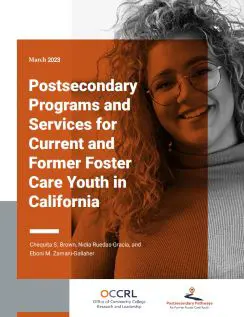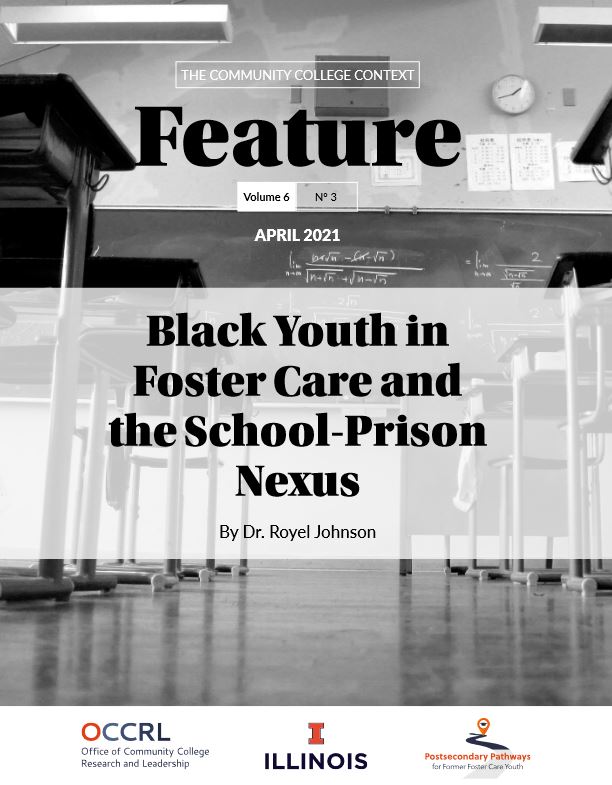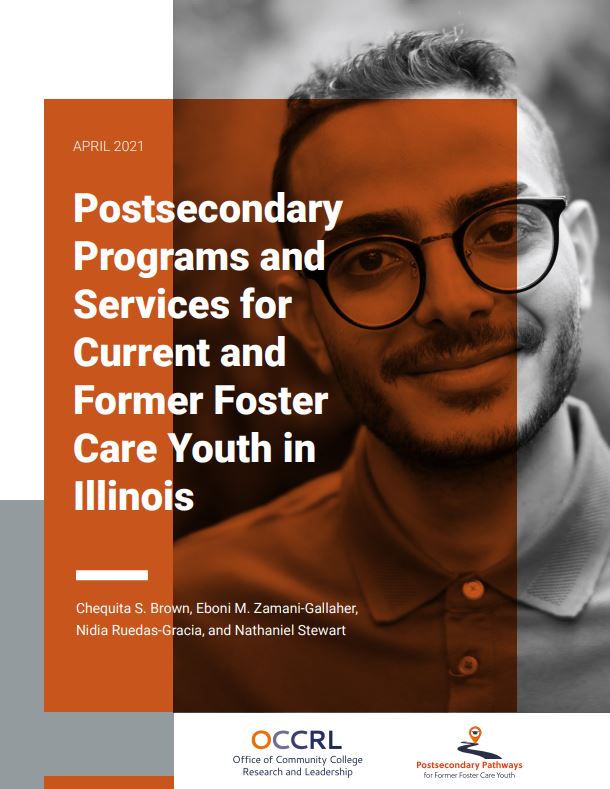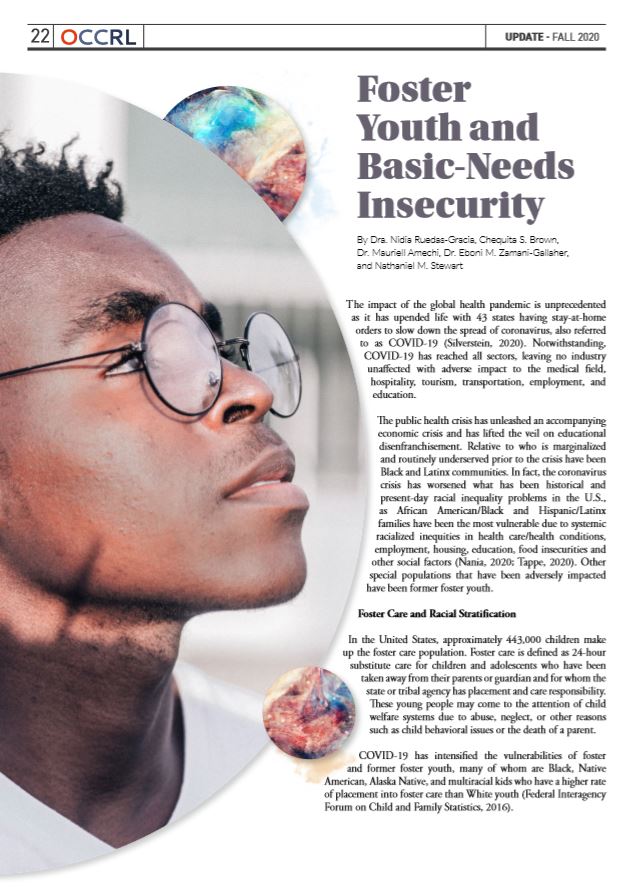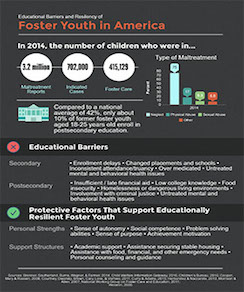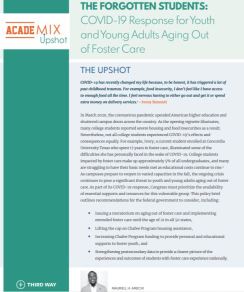Summary
The Postsecondary Pathways for Former Foster Care Youth (PP-FFCY) reflects OCCRL’s commitment to examining and developing postsecondary pathways that support mobility for first-generation, underserved, and minoritized populations, as well as strengthening career pathways to promote seamless transitions from college to careers. This project endeavors to examine postsecondary access, opportunities, and supports for foster youth in Illinois and other states across the county in addressing access and outcomes of FFCY in Career Technical Education (CTE).
Purpose
The Postsecondary Education Pathways for Former Foster Care Youth (PP-FFCY) project is an exploratory study focused on postsecondary pathways for current and former foster youth in Illinois. OCCRL is conducting a comprehensive-needs assessment that provides a descriptive profile of current and former foster youth populations in Illinois; examines postsecondary access, opportunities, and supports for foster youth in Illinois; and addresses disparities in career and technical education (CTE) programs. This project reflects OCCRL’s commitment to examining and developing postsecondary pathways that support mobility for first-generation, underserved, and minoritized populations as well as strengthening and supporting career pathways to promote seamless transitions from college to careers.
Resources
OCCRL aims to increase postsecondary awareness, access, and attainment for current and former foster care youth by providing information on programs and other resources that offer holistic support and services. View the list of postsecondary programs and services.
Podcasts
Strategies to Cultivate a Foster-Friendly Culture on Community College Campuses
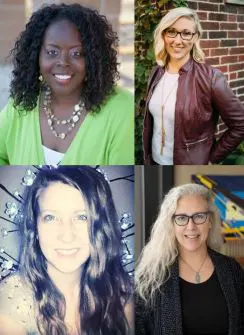 In this episode, Chequita Brown talks with Kate Danielson of the organization Foster Progress, as well as with Anna Wandtke and Tricia Wagner of Rock Valley College in Rockford, Illinois. The group discusses how to cultivate a foster-friendly culture at Illinois community colleges.
In this episode, Chequita Brown talks with Kate Danielson of the organization Foster Progress, as well as with Anna Wandtke and Tricia Wagner of Rock Valley College in Rockford, Illinois. The group discusses how to cultivate a foster-friendly culture at Illinois community colleges.
Navigating College as a Foster Care Alum
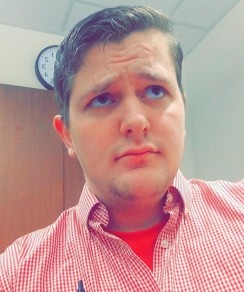 In this episode, OCCRL research assistant Chequita S. Brown talks with Jonathan Stacy, a sophomore at Heartland Community College who is pursuing his studies and a possible career in criminal justice.
In this episode, OCCRL research assistant Chequita S. Brown talks with Jonathan Stacy, a sophomore at Heartland Community College who is pursuing his studies and a possible career in criminal justice.
Listen to the podcast and view the transcript.
Key Elements to Successfully Connecting Foster Care Youth to Educational Resources for Postsecondary Success
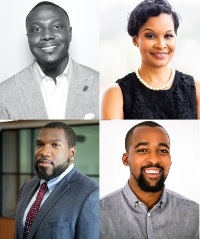 In this episode, Nathaniel Stewart talks with Mauriell Amechi, Regina Gavin Williams, and Blayne Stone Jr. about how the transitions and pathways to postsecondary education are similar and different for Black former foster care students. The scholars also discuss key elements to successfully connect foster care youth to educational resources that help advance the postsecondary education opportunities for this student population.
In this episode, Nathaniel Stewart talks with Mauriell Amechi, Regina Gavin Williams, and Blayne Stone Jr. about how the transitions and pathways to postsecondary education are similar and different for Black former foster care students. The scholars also discuss key elements to successfully connect foster care youth to educational resources that help advance the postsecondary education opportunities for this student population.
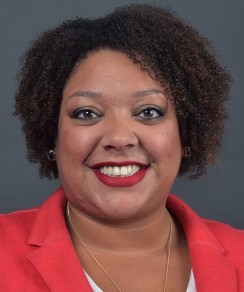
Maddy Day
The Impact of Campus-Based Support Programming on Foster Care Collegians' Postsecondary Access and Retention
In this episode, Chequita Brown of OCCRL talks with Maddy Day about the Fostering Success initiative in Michigan and the impact of campus-based support programming on foster carecollegians' postsecondary access and retention.
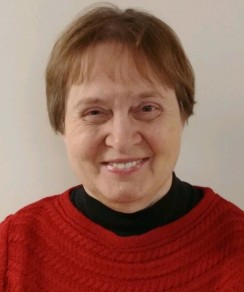
Patricia Palmer
How Youth-in-Care in Illinois Can Access Educational Resources to Pursue a Postsecondary Education
In this episode, OCCRL research assistant Chequita Brown continues the conversation on foster care youth by talking about with Patricia Palmer about accessing available resources in Illinois for youth-in-care who want to pursue a postsecondary education.
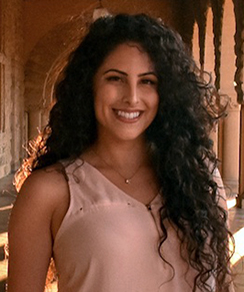
Nidia Ruedas-Gracia
Conceptualizing 'Sense of Belonging' Among Students From Historically Minoritized Racial Groups Within Higher Education
In this episode, Colvin Georges Jr., a research associate at OCCRL, talks with Dr. Nidia Ruedas-Gracia about what it means to have a sense of belonging and discusses her research in this area. They also discuss how a sense of belonging affects college students from historically minoritized racial groups.
Publications
Postsecondary Programs and Services for Current and Former Foster Care Youth in California
By Chequita S. Brown, Nidia Ruedas-Gracia, and Eboni M. Zamani-Gallaher
This brief highlights postsecondary programs and services in California that support youth in care, in addition to young adults who are aging out of foster care. Read more.
Tracking College-to-Career Pathways for Foster Youth
By Chequita S. Brown
In this OCCRL Thought Paper, Chequita S. Brown relates how tracking the data of students with foster care experience helps to recognize them as a legitimate student population. She offers recommendations on how to do this and conveys the many obstacles that can hinder the academic and career success of foster youth. Read more.
Black Youth in Foster and the School-Prison Nexus
By Royel Johnson
In this OCCRL Feature Brief, Dr. Royel Johnson argues that the foster care system, and more specifically congregate care facilities, are part and parcel to the enhancement of carceral state power. Read more.
Postsecondary Programs and Services for Current and Former Foster Care Youth in Illinois
By Chequita S. Brown, Eboni Zamani-Gallaher, Nidia Ruedas-Gracia, and Nathaniel M. Stewart
This research brief provides an overview of programs and services that helps strengthen postsecondary pathways for current and former foster youth in Illinois. Read more.
Foster Youth and Basic-Needs Insecurity
By Dra. Nidia Ruedas-Gracia, Chequita S. Brown, Dr. Mauriell Amechi, Dr. Eboni Zamani-Gallaher, and Nathaniel M. Stewart
This article discusses how COVID-19 has intensified the vulnerabilities of foster youth and former foster youth, many of whom are Black, Native American, Alaska Native, and multiracial children who have a higher rate of placement into foster care than White youth (Federal Interagency Forum on Child and Family Statistics, 2016). Read more.
(From the Fall 2020 UPDATE on Research and Leadership)
Exploring Equity in Postsecondary Education
By Heather L. Fox, Eboni M. Zamani-Gallaher
This chapter examines how postsecondary practitioners are encouraged to work collaboratively with child welfare agencies and other community-based organizations to identify and implement culturally responsive supports for former foster youth to promote early academic achievement. Read more.
The Forgotten Students: COVID-19 Response for Youth and Young Adults Aging Out of Foster Care
By Mauriell H. Amechi
This policy brief outlines recommendations for Congress to consider regarding the country's COVID-19 response, in an effort to prioritize the availability of essential supports and resources for youth and young adults who are aging out of foster care. Read more.
Voices and Viewpoints
Creating Cross-Disciplinary Faculty-Learning Experiences Through NISOD Regional Workshops
Entering the world of teaching, whether as a newcomer or a seasoned educator, can be both rewarding and challenging. Although the journey is filled with opportunities to connect with students and inspire learning, it can also bring moments of burnout and disillusionment. By building on- and off-campus communities, one can gain fresh perspectives, learn new strategies, and find renewed inspiration in teaching practices.
Research shows that both early-career and senior faculty can benefit from participating in cross-disciplinary faculty-learning communities (FLC) (Karpiak, 1997; Rice et al., 2000). Rice et al. (2000) revealed that early-career faculty reported a desire to work in communities in which collaboration “is respected and encouraged” (p. 13). These same faculty expressed an interest in developing friendships among colleagues within and across departments, with time and opportunities to interact with and learn from one another.
A study of midcareer faculty conducted by Karpiak (1997) found that these faculty experienced burnout and no longer found teaching rewarding, leaving them in desperate need of renewal. In addition, the group felt isolated and on the periphery. The study resulted in 10 recommendations that included creating community among colleagues, stimulating creativity, learning from one another, and developing support networks (Karpiak, 1997).
The National Institute for Staff and Organizational Development (NISOD) facilitates faculty-learning communities through its workshops hosted on college campuses. The events bring together educators in the region to network, become inspired, and discover best practices. The workshops also foster continued connections among participants beyond the events.
Spartanburg Community College (SCC) hosted a NISOD Regional Workshop titled “The Age of Artificial Intelligence and Learning,” facilitated by Judith Cardenas. Cheryl Cox, the senior vice president of academic affairs at SCC, said the workshop was “terrific,” adding:
“It was definitely a hands-on experience and a great example of the power of active learning. Participants were thoroughly engaged throughout the entire workshop. The information and activities shared led me to consider how we interact with our students and the powerful impact that artificial-intelligence processes could have on improving that interaction.”
This April, Richland Community College will host a NISOD Regional Workshop titled “Relationships Matter,” facilitated by Juan R. Abascal and Dominic Brucato, two engaging presenters who will provide techniques to make teaching more fun and effective.
NISOD encourages individuals to attend these enriching professional-development experiences to gain the necessary tools to create effective relationships with students, encourage students to take more risks with their learning, and unlock the potential of faculty-learning communities.
Kris Tolman is the manager of education programming at NISOD.
Edward J. Leach, the executive director of NISOD, is an OCCRL affiliate member.
References
Karpiak, I. E. (1997). University professors at mid-life: Being part of…but feeling apart. To Improve the Academy, 16, 21-40.
Rice, R. E., Sorcinellin, M. D., Austin, A. E. (2000). Heeding new voices: Academic careers for a new generation. Inquiry# 7. Working Paper Series. New Pathways: Faculty Careers and Employment for the 21st Century.




